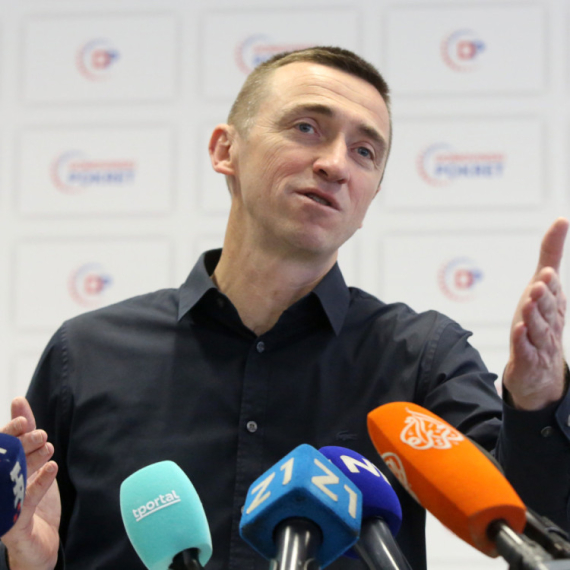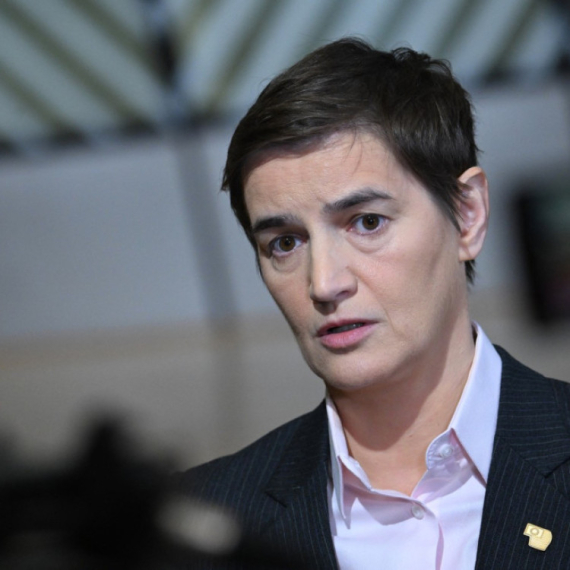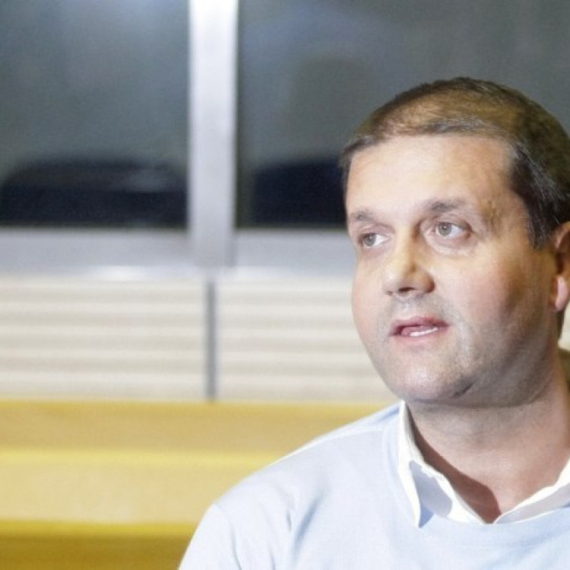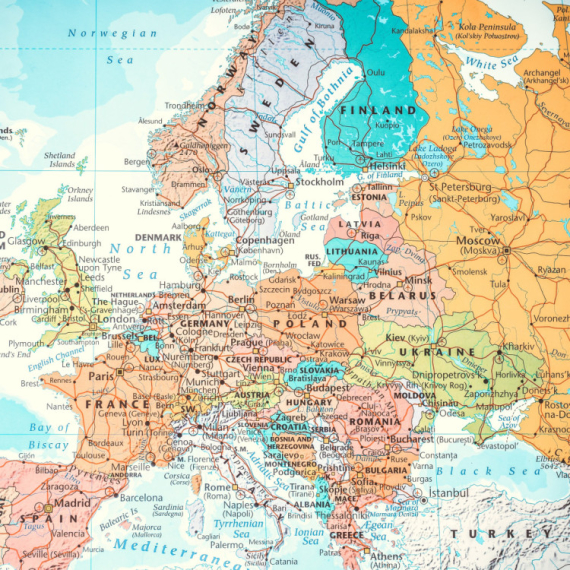"Parliamentary, presidential elections in 2012"
Serbia’s President Boris Tadić said Friday that both parliamentary and presidential elections would be held in 2012.
Friday, 30.12.2011.
13:32

Serbia’s President Boris Tadic said Friday that both parliamentary and presidential elections would be held in 2012. “According to the Serbian Constitution, it is impossible to hold presidential elections in 2013 and they have to be held by the end of 2012,” he told a press conference. "Parliamentary, presidential elections in 2012" Tadic was elected in the second round of the presidential elections on February 3, 2008 to a five-year term. According to the Constitution, presidential elections are called 90 days before the president’s term expires and they have to be held 30 days before the end of the term, i.e. January 3, 2013. The president noted that the parliamentary elections would be held before the legal deadline and in accordance with the Serbian Constitution. He admitted that he had made a mistake when he did not tell the citizens in time that not all pre-election promises could be kept. “My biggest mistake is the fact that I did not come out before the citizens in 2008 and said that we woke up to a completely different world and that it was not possible to achieve everything we promised before of the elections,” Tadic noted. He explained he had planned to do so but that he had changed his mind because he believed that citizens would feel like he was looking for an excuse for all the things he could not do. Tadic stressed that only the EU pathway guaranteed stability, better standard of living, new investments and a modernization of Serbia. "This is a process that must not be stopped, regardless of the problems the EU is being faced with," he told reporters. The president stated that main goals in 2012 would be reducing unemployment, attracting investors and raising the standard of living of the Serbian citizens. “Economic issues are vital for the lives of citizens, which puts economy to the forefront of issues to tackle in the future,” he told the last press conference this year. “Unemployment is the biggest problem and the Serbian government has to focus primarily on resolving the issue, a central one in the year ahead,” Tadic pointed out. “We must be prepared for the new wave of crisis. Measures for 2012 are being drafted carefully in line with the forecasts by international financial institutions, particularly the International Monetary Fund (IMF),” he said. He pointed out that stability of public finances and avoiding public debt crisis, stagnation and drop in economic activities and recession would be priorities in 2012. Tadic underscored that the second wave of global economic crisis had affected the business environment in Serbia, adding that the crisis in the EU countries had an impact on Serbia's economy, as about 60 percent of the country's exports go to the EU. “Despite the unfavorable environment, some positive indicators were also there, such as the fact that exports grew by 15 percent, GDP went up by two percent and more has been invested in Serbia than in all other countries of the region,” he explained. “Economic recovery gives the country the economic potential to defend its national interests,” Tadic concluded. He said that he expected the European Union to reach a positive decision on Serbia's candidate status in March. “I cannot promise that this will happen, but I promise I will do everything in my power for it to come true,” Tadic told the reporters. Boris Tadic (Tanjug, file) “I have plan for Kosovo” Tadic stated he had a clear plan how the situation in Kosovo should be resolved and added that he had informed the representatives of foreign countries about the main ideas. Serbia will officially propose the solution after estimating whether it could be effective. “I first have to finish talks with European partners and our institutions, and after that present the proposal to the parliament and citizens,” Tadic said. He noted that in future all the energy had to be put into finding a comprehensive solution for Kosovo. The president specified that he did not change the center of his “both EU and Kosovo” policy. "We are in a very difficult situation, but this does not mean we should give up our legitimate interests. We have to do all we can to fight for our interests and enable the fulfillment of both goals - EU and Kosovo," he stressed. According to the president, there are people in Serbia who suggest giving up the European integration, as well as those who suggest renouncing Kosovo for the sake of the integration. “Everyone who proposes giving up EU integration in order to save Kosovo should know that Serbia would thus lose all chances to preserve its national interests in Kosovo and Metohija," he cautioned. Tadic said that the municipal presidents from northern Kosovo often acted upon the political initiatives of their parties from Belgrade. “It is easy to prevent Serbia from becoming a candidate for the EU membership by setting up barricades. However, everyone should contribute to EU integration, not only verbally from Belgrade, but also through their representatives in northern Kosovo," the president said, noting that today the barricades were just a symbolic expression of resistance. He pointed out that Serbia did not give up on UN Security Council Resolution 1244 when it came to Pristina's presentation at regional meetings, because the country had a comprehensive solution for Kosovo on its mind, and because the resolution was the only document from which we could form the solution. Tadic reiterated that no one has ever demanded an explicit recognition of Kosovo's independence from him, because his interlocutors thought this was impossible and rude, but, however, added that it was indisputable that the request to give up Resolution 1244 is actually a request to recognize Kosovo's independence implicitly. “Serbia has to propose a solution which respects the legitimate interest of Albanians and the institutions in Pristina, but which, at the same time, does not violate Serbia's interests. I am convinced that such a solution is possible,” the president explained. “If someone demands from me to explicitly recognize Kosovo, I will say that publicly. This is why I am now telling the citizens that the EU integration is our path, but that we are not giving up the legitimate interests in Kosovo and Metohija,” he stressed. “Any opposite policy would question Serbia's integrity, because it would imply that we are ready to renounce some other parts of the country, which could be a part of international appetites,” Tadic concluded. Beta Tanjug
"Parliamentary, presidential elections in 2012"
Tadić was elected in the second round of the presidential elections on February 3, 2008 to a five-year term. According to the Constitution, presidential elections are called 90 days before the president’s term expires and they have to be held 30 days before the end of the term, i.e. January 3, 2013.The president noted that the parliamentary elections would be held before the legal deadline and in accordance with the Serbian Constitution.
He admitted that he had made a mistake when he did not tell the citizens in time that not all pre-election promises could be kept.
“My biggest mistake is the fact that I did not come out before the citizens in 2008 and said that we woke up to a completely different world and that it was not possible to achieve everything we promised before of the elections,” Tadić noted.
He explained he had planned to do so but that he had changed his mind because he believed that citizens would feel like he was looking for an excuse for all the things he could not do.
Tadić stressed that only the EU pathway guaranteed stability, better standard of living, new investments and a modernization of Serbia.
"This is a process that must not be stopped, regardless of the problems the EU is being faced with," he told reporters.
The president stated that main goals in 2012 would be reducing unemployment, attracting investors and raising the standard of living of the Serbian citizens.
“Economic issues are vital for the lives of citizens, which puts economy to the forefront of issues to tackle in the future,” he told the last press conference this year.
“Unemployment is the biggest problem and the Serbian government has to focus primarily on resolving the issue, a central one in the year ahead,” Tadić pointed out.
“We must be prepared for the new wave of crisis. Measures for 2012 are being drafted carefully in line with the forecasts by international financial institutions, particularly the International Monetary Fund (IMF),” he said.
He pointed out that stability of public finances and avoiding public debt crisis, stagnation and drop in economic activities and recession would be priorities in 2012.
Tadić underscored that the second wave of global economic crisis had affected the business environment in Serbia, adding that the crisis in the EU countries had an impact on Serbia's economy, as about 60 percent of the country's exports go to the EU.
“Despite the unfavorable environment, some positive indicators were also there, such as the fact that exports grew by 15 percent, GDP went up by two percent and more has been invested in Serbia than in all other countries of the region,” he explained.
“Economic recovery gives the country the economic potential to defend its national interests,” Tadić concluded.
He said that he expected the European Union to reach a positive decision on Serbia's candidate status in March.
“I cannot promise that this will happen, but I promise I will do everything in my power for it to come true,” Tadić told the reporters.
“I have plan for Kosovo”
Tadić stated he had a clear plan how the situation in Kosovo should be resolved and added that he had informed the representatives of foreign countries about the main ideas.Serbia will officially propose the solution after estimating whether it could be effective.
“I first have to finish talks with European partners and our institutions, and after that present the proposal to the parliament and citizens,” Tadić said.
He noted that in future all the energy had to be put into finding a comprehensive solution for Kosovo.
The president specified that he did not change the center of his “both EU and Kosovo” policy.
"We are in a very difficult situation, but this does not mean we should give up our legitimate interests. We have to do all we can to fight for our interests and enable the fulfillment of both goals - EU and Kosovo," he stressed.
According to the president, there are people in Serbia who suggest giving up the European integration, as well as those who suggest renouncing Kosovo for the sake of the integration.
“Everyone who proposes giving up EU integration in order to save Kosovo should know that Serbia would thus lose all chances to preserve its national interests in Kosovo and Metohija," he cautioned.
Tadić said that the municipal presidents from northern Kosovo often acted upon the political initiatives of their parties from Belgrade.
“It is easy to prevent Serbia from becoming a candidate for the EU membership by setting up barricades. However, everyone should contribute to EU integration, not only verbally from Belgrade, but also through their representatives in northern Kosovo," the president said, noting that today the barricades were just a symbolic expression of resistance.
He pointed out that Serbia did not give up on UN Security Council Resolution 1244 when it came to Priština's presentation at regional meetings, because the country had a comprehensive solution for Kosovo on its mind, and because the resolution was the only document from which we could form the solution.
Tadić reiterated that no one has ever demanded an explicit recognition of Kosovo's independence from him, because his interlocutors thought this was impossible and rude, but, however, added that it was indisputable that the request to give up Resolution 1244 is actually a request to recognize Kosovo's independence implicitly.
“Serbia has to propose a solution which respects the legitimate interest of Albanians and the institutions in Priština, but which, at the same time, does not violate Serbia's interests. I am convinced that such a solution is possible,” the president explained.
“If someone demands from me to explicitly recognize Kosovo, I will say that publicly. This is why I am now telling the citizens that the EU integration is our path, but that we are not giving up the legitimate interests in Kosovo and Metohija,” he stressed.
“Any opposite policy would question Serbia's integrity, because it would imply that we are ready to renounce some other parts of the country, which could be a part of international appetites,” Tadić concluded.











































Komentari 10
Pogledaj komentare